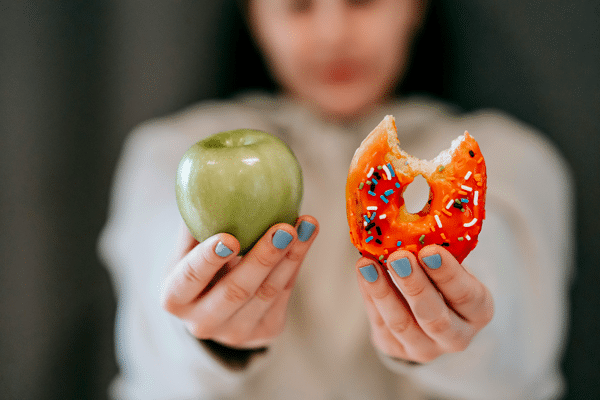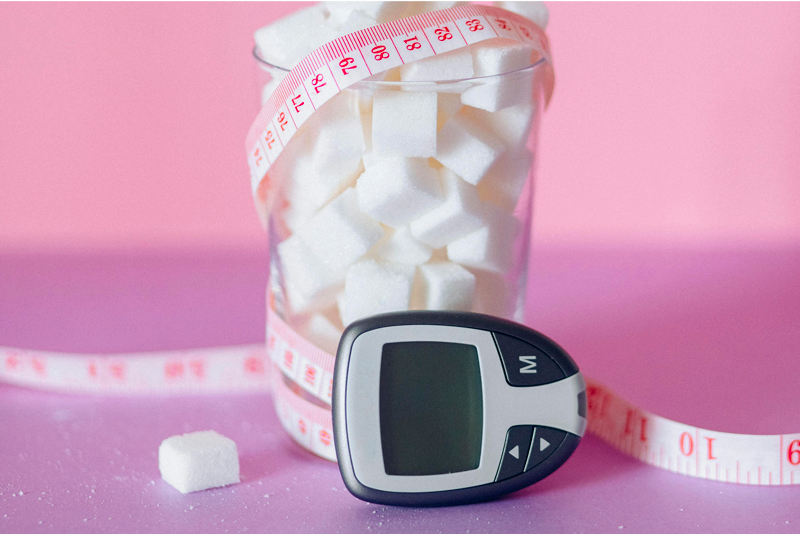
Are you among the many people who feel exhausted after a meal? This sensation, which we call post-prandial fatigue, is not only common, but may also be a signal that your body is sending to communicate about its state of health. Feeling drowsy after eating may point towards either a necessary adjustment of eating habits, or reveal underlying medical conditions of greater concern. Understanding this phenomenon is therefore essential. Need more information on the link between diet and well-being? Discover essential advice on pre-diabetes and improve your quality of life.
Defining and understanding post-prandial fatigue
What is post-prandial fatigue?
You probably know the feeling: after enjoying your lunch, your eyelids become heavy and your mind fogs up. Post-meal fatigue is precisely that sluggishness that hits you when your body concentrates on digestion. You have had your fill of energy with a delicious meal, and yet here you are, fighting off sleep!
The physiological process of digestion and its effect on energy
Why does our body seemingly throw in the towel when it should be in top form? The answer lies in the complex mechanisms of our digestive system. When we eat food, our bodies use a considerable amount of energy to chew it, absorb it and turn it into essential nutrients. This intense metabolic activity can account for up to 10% of our daily energy expenditure. The more copious and calorie-rich the feast, the harder the task for our digestive system.
To kick-start and sustain this complex machinery, it requires a greater blood flow to the digestive tract to transport these precious nutrients. Meanwhile, the rest of the body has to make do with a little less attention. This goes some way to explaining why we get that notorious post-meal energy crash.
However, there is also a temporal dimension to consider: our natural circadian rhythms predispose certain times of the day to sleepiness, particularly the early afternoon. So, even without a gargantuan meal or an unbalanced diet, it is quite normal to feel a little lethargic around 2.30 to 3pm. It is in our genes, our bodies are governed by very precise internal clocks.
Possible causes of tiredness after meals
Dietary factors influencing post-prandial fatigue
The secret to the tiredness you feel after eating may be found in your plate. Dietician and nutritionist Véronique Liesse points to a recurring culprit: reactive hypoglycaemia. Imagine you have just eaten a meal rich in fast sugars, in Al Dente pasta or in crusty white bread. These hyperglycaemic carbohydrates, when ingested in large quantities, cause a meteoric rise in blood sugar levels, followed by an equally intense release of insulin. And that is when the infamous “energy crash” occurs.
This feeling can be exacerbated by the presence of refined starchy foods or if the ratio between food intake and physical activity is not balanced. And then there is also alcohol, with its proven hypoglycaemic effects. So, to resist falling into Morpheus’ arms, perhaps we should start by moderating our consumption of these elements during our meals.
Medical conditions associated with post-prandial fatigue
In addition to eating habits, certain medical conditions can also play a role in post-meal fatigue. In diabetics, poor adaptation of insulin treatment to their eating habits can lead to episodes of postprandial hypoglycaemia. It is therefore crucial for these patients to accurately assess how many insulin units they require.
Furthermore, diseases such as Alzheimer’s, Parkinson’s or even certain hormonal disorders can accentuate this feeling of fatigue. Not to mention the notorious circadian rhythms that orchestrate our waking and sleeping phases, which naturally predispose us to feel a drop in energy around six hours after waking up.
Finally, if you find that this sluggishness becomes an all too frequent occurrence after your meals, despite your efforts to adopt a healthier, more balanced diet, it would be wise to talk to a specialist. A precise diagnosis could help you to regain your vitality and face your days with zest.
Symptoms and signs of post-prandial fatigue
Identifying the symptoms of postprandial fatigue
You may have noticed that your concentration wanes, that your productivity drops or that you feel unusually heavy after a meal. These are all classic signs of postprandial fatigue. But how can you tell the difference between a simple, natural need for rest and a red flag?
Here are a few symptoms that might alert you:
- Heavy eyelids and frequent yawning shortly after eating;
- Difficulty concentrating on usual tasks;
- A general feeling of malaise or exhaustion;
- Lack of energy, even after a balanced meal.
If these signs become recurrent, it is a good idea to check whether your diet is to blame or whether this could be the harbinger of a more serious medical condition. Do not hesitate to make a note of these symptoms; they will be invaluable if you eventually seek medical advice.
When should you consult a health professional?
It is true that a certain amount of sleepiness after eating can be normal, but when should you be concerned? If you notice intense, systematic fatigue that disrupts your daily routine, it is advisable to make an appointment with a doctor. Especially if this fatigue sets in along with other signs, such as:
- Repeated episodes of unexplained hypoglycaemia;
- Persistent difficulty performing simple tasks;
- A lethargic state that does not go away with rest.
Do not forget that chronic post-prandial fatigue can mask disorders such as anaemia, sleep apnoea or endocrine pathologies such as diabetes. If you are experiencing these symptoms, you could also consider talking to your GP about the potential benefits of using a phototherapy lamp to combat the winter energy slump. And remember: listening to your body is often the first step towards recovery.
Prevention and strategies for managing post-prandial fatigue
Nutritional advice to reduce fatigue after meals
Our diet plays a major role in the onset of the infamous post-prandial fatigue. So how do you put together your menu to avoid this fatigue?
- Ban fast sugar: it is no secret that foods rich in simple sugars should be eaten sparingly. They cause blood sugar levels to spike and then plummet just as quickly, leaving you with an irresistible urge to snooze.
- Split your meals: rather than three large feasts, opt for smaller portions spread throughout the day. This method makes digestion easier and keeps your energy levels stable.
- Avoid excess: dishes that are too rich in protein or fat require considerable digestive effort. Instead, opt for a varied and balanced diet, rich in vegetables and fibre.
These recommendations may seem obvious, but you would be surprised at how efficient they can turn out!
The role of physical activity and sleep
What can you do if, despite an exemplary breakfast, you are still feeling tired? Physical exercise can be an unexpected ally against this phenomenon. A short walk after a meal not only stimulates your blood circulation, but also your digestion. And if you thought coffee would help, think again: it could well disrupt your nights and make the problem worse in the long term.
What is more, a good night’s sleep prepares your body for the next day’s challenges, including better resistance to post-prandial fatigue. So make sure you respect your nightly cycles and and avoid indulging in frequent late nights.
By combining a sensible diet with appropriate physical activity and restful sleep, you can successfully combat the insidious lethargy that lurks after every meal.
Possible treatments and interventions
Medicinal approaches and food supplements
Sometimes adjusting your diet will not suffice, and you will have to consider other options. Among these, medicinal approaches may be relevant, especially if post-prandial fatigue is symptomatic of an underlying condition requiring specific treatment.
Before turning to medical prescriptions however, have you considered the potential contribution of food supplements?
When the drop in energy is linked to variations in blood sugar levels, a dietary supplement incorporating Pep2Dia® can help to regulate blood sugar peaks after meals, thereby reducing the feeling of tiredness.
For moments of low energy unrelated to blood sugar, natural ingredients such as ginseng, guarana or theine are effective in revitalising both concentration and physical vigour.
However, you should always consult a health professional before taking any supplements.
Alternative therapies and lifestyle changes
What if the key lay in age-old practices or a return to our roots? Incorporating beneficial natural foods into our daily diet can play a crucial role. Aromatic herbs such as parsley or oregano not only enhance the flavour of food, they also help to improve digestion and revitalise the digestive system. These nutritional adjustments, inspired by traditional herbal medicine, help to balance body and mind by taking advantage of healing properties tried and tested over time.
Why not opt for hot cooking with digestive spices such as ginger or cardamom? Not only do they enhance flavour, but they also promote lighter digestion.
In this quest for well-being, it is essential to reflect on our daily habits. Eating mindfully, away from the hustle and bustle of work, or dividing your meals into smaller portions, could well be the small change that makes all the difference.A subtle blend of a balanced diet, gentle physical activity and rest will certainly help you to recharge your batteries and avoid post-prandial fatigue. Certain bioactive ingredients such as Pep2Dia® help maintain healthy blood sugar levels.
Our latest publications
Want to learn more about topics related to blood sugar management?
Here are our most recent blog posts!



